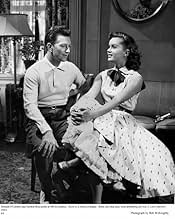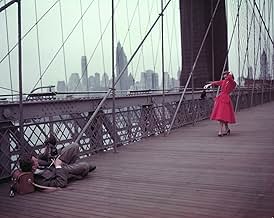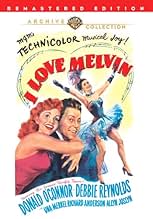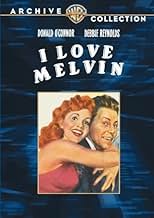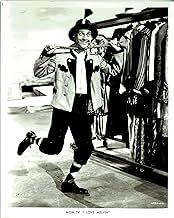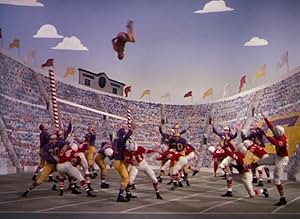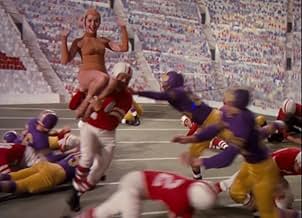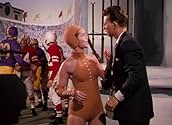Aggiungi una trama nella tua linguaMelvin, a photographer for "Look" magazine, meets Judy and wants to marry her. Her father is against that and as a last resort, Melvin promises to get Judy's photo on the cover of the next i... Leggi tuttoMelvin, a photographer for "Look" magazine, meets Judy and wants to marry her. Her father is against that and as a last resort, Melvin promises to get Judy's photo on the cover of the next issue, a task easier said than done.Melvin, a photographer for "Look" magazine, meets Judy and wants to marry her. Her father is against that and as a last resort, Melvin promises to get Judy's photo on the cover of the next issue, a task easier said than done.
- Chorine
- (non citato nei titoli originali)
- Mrs. Bernstein
- (non citato nei titoli originali)
- Police Captain
- (non citato nei titoli originali)
- Chorus Boy
- (non citato nei titoli originali)
- Minor Role
- (non citato nei titoli originali)
- Meek Man
- (non citato nei titoli originali)
- Look Magazine Board of Directors
- (non citato nei titoli originali)
- Fat Man on Bench
- (non citato nei titoli originali)
Trama
Lo sapevi?
- QuizThe opening segment is Debbie Reynolds singing "A Lady Loves (to Love)" in a sophisticated setting. A second version in a rural setting was shot but cut from the film; it can be seen in That's Entertainment! III (1994).
- Citazioni
Judy: They want me to marry Harry Flack!
Melvin: Judy, you can't! I-I love you, Judy!
Judy: Shh... Melvin...
Melvin: You're not gonna do it, are you?
Judy: Well, you see...
Melvin: Because if you do it, I'll be very frank about this, Judy. If you do it, I'll kill myself!
Judy: Melvin! Stop it!
Melvin: I mean it! Judy, you know how I feel! I'd do anything for you! I'd rob a bank, I'd take a rocket to the moon, anything! Just ask me!
Judy: Put me on the cover! My picture, on the cover of the magazine!
Melvin: Judy, I said I'd kill myself or take a rocket to the moon, but don't ask the impossible!
- Curiosità sui creditiThe dream sequence during opening credits shows Debbie Reynolds in a dressing room. She breaks the fourth wall by looking at the camera and then writing the title with lipstick on a mirror.
- ConnessioniFeatured in Frank's Place: I.O.U. (1987)
Overall I don't know why people are saying these musical numbers in this film aren't as good as 'Singin' in the Rain.' In my opinion, while the melodies aren't quite as memorable, the way the music is constructed(harmonies etc) is far superior to that of it's more famous cousin.
There are plenty of strange moments throughout the movie, however. So strange that they create unexpected humour. For one, Donald's solo dance number while cleaning the studio only made sense after I read about it. When watching it, I couldn't understand what was going on. Furthermore, the football scene with Debbie in it was so bizarre that you had to laugh. I think this unintended humour made things a little better, but knowing it was unintended put a little downer on things.
What the story does well is create an emotional investment in the characters - I felt for Debbie's character as I knew how much she wanted to be on the cover of the magazine. I also felt for Donald's character as he tried to set things right. However that's about the only thing I liked about the plot.
Debbie and Donald are both great here - Donald already well established, and Debbie trying to make her break since Singin in the Rain. It's obvious these two have more chemistry than the Reynolds/Kelly combination, probably due to age differences and things(Debbie would have been around 20 and Donald around 27, whereas Gene was already 40)
While the film is short, the ending seemed extremely rushed to me, and could have benefitted from a few extra minutes of footage. What happened afterwards? A lot of unanswered questions were left. Furthermore, the very end shot of Debbie frantically fondling Donald didn't leave a great taste to end. Something more calm would have made the ending seem less frantic and rushed.
Also, there are plenty of script moments which seem very strange to a modern viewer(this is all part of historical relativism I assume) - such as a random man approaching Debbie and asking her if he could walk her places, which she just calmly responds 'No, thank you.' whereas today, this would seem extremely bizarre. Similarly, the 50's housewife persona is capitalised here - e.g. 'I'll cook just like my mother taught me'(Debbie) contrasting with the more dominant male persona(her father) is very apparent here. There is nothing necessarily wrong with this, it's just a point that I noticed.
Some of the script was extremely unconvincing - a mere 30 minutes in, Donald confesses his love for her in a car, and then says 'if you marry this other boy, I'll be very frank, I'll kill myself.' I have to commend Donald for selling such an unconvincing piece of dialogue barely a third of the way through.
It has been said that both Debbie and Donald did not enjoy the process of making this film, and it's easy to see that the plot, narrative and script were not as well thought out as it could have been. However, the talent of the two main actors show how much of a triple threat they both were.
Overall, this film has some very bizarre moments, with a few plot holes, unconvincing scriptwriting and a rushed conclusion. To save it, the talent of the two main actors plus the great musical numbers and the emotional story help out.
- cammonteath
- 18 apr 2020
- Permalink
I più visti
- How long is I Love Melvin?Powered by Alexa
Dettagli
Botteghino
- Budget
- 1.300.000 USD (previsto)
- Tempo di esecuzione1 ora 17 minuti
- Proporzioni
- 1.37 : 1
Contribuisci a questa pagina




